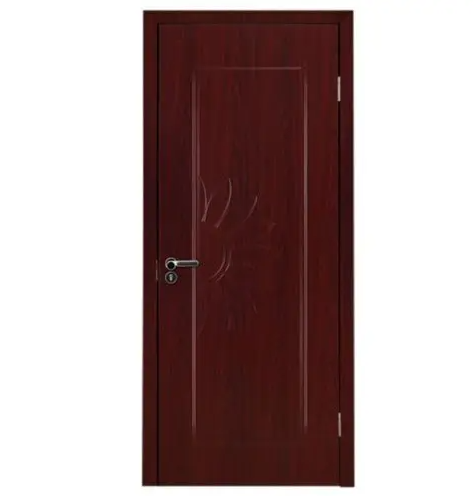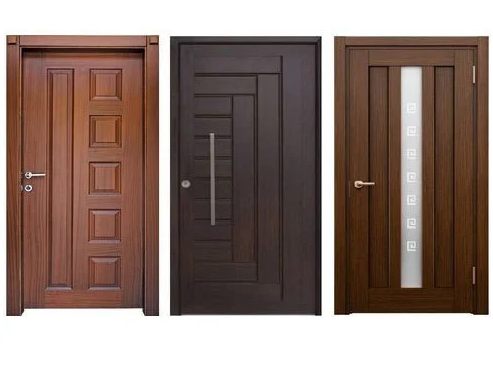A PVC door typically lasts between 20 to 40 years, depending on usage and maintenance.
The Basics of PVC Material
PVC, which stands for Polyvinyl Chloride, is one of the most widely used synthetic plastic polymers in the world. From its inception in the early 20th century, it has found applications in various industries due to its versatile properties.

Composition and properties of PVC
PVC is primarily composed of chlorine, derived from industrial grade salt, and ethylene, obtained from hydrocarbons. This unique composition gives PVC some distinct properties:
- Chemical Resistance: PVC has a high resistance to acids, alkalis, and other chemicals, making it ideal for pipes and fittings.
- Low Cost: One of the reasons for its widespread use is its cost-effectiveness. The process of manufacturing PVC, coupled with its raw material availability, makes it a cheaper alternative to other materials.
- Flexibility: Depending on the additives used during its production, PVC can range from a rigid plastic to a soft and flexible one. This is the reason we see PVC in rigid structures like pipes and also in flexible forms such as vinyl flooring.
- Insulation Properties: PVC is a good insulator, making it a preferred choice for electrical conduits and cables.
General durability of PVC products
Durability is one of the hallmarks of PVC. Here are some reasons why:
- Weather Resistance: PVC can withstand varied weather conditions, from scorching heat to freezing temperatures, making it ideal for outdoor applications.
- Non-Corrosive: Unlike metals, PVC does not rust or corrode, adding to its longevity.
- Low Maintenance: PVC does not require frequent maintenance. For instance, a PVC window frame might just need occasional cleaning to keep it looking new.
- Resistance to Pests: Unlike wood, PVC is not susceptible to termites or other pests, ensuring its longevity in various applications.
Factors Affecting the Lifespan of a PVC Door
The longevity and durability of a PVC door depend on several intertwined factors. While PVC is known for its resilience and strength, certain conditions and variables can influence how long a PVC door remains functional and aesthetically pleasing.
Quality of PVC material
The core determinant of a PVC door’s lifespan is the quality of the PVC used in its manufacture. High-quality PVC tends to have:
- Uniform Composition: This ensures there are no weak points or imperfections in the door.
- Optimal Density: The density plays a direct role in determining the strength and durability of the door.
- Inclusion of Stabilizers: Good quality PVC doors often contain stabilizers that prevent degradation due to external factors.
It’s always advisable to choose doors from reputable manufacturers, as they often adhere to stringent quality checks.
Environmental factors
The environment in which a PVC door is installed plays a pivotal role in determining its longevity.
- Exposure to sunlight and UV radiation: Continuous exposure to sunlight can lead to the door losing its color and becoming brittle over time. UV radiation, in particular, can degrade the molecular structure of PVC. However, many modern PVC doors come with UV stabilizers to counteract this effect.
- Temperature fluctuations: PVC doors are resilient to a wide temperature range, but extreme fluctuations can cause expansion and contraction, which over time might lead to structural weakening or misalignment.
Benefits of Using PVC Doors
PVC doors have steadily gained popularity in various settings, from homes to commercial spaces, primarily due to the multitude of advantages they offer over traditional materials. Here’s a deep dive into some of their standout benefits:
Resistance to rot and corrosion
Unlike wood or metal doors, PVC doors stand firm against the test of time and environment:
- Against Rot: Wood, when exposed to moisture for prolonged periods, tends to rot. This is not the case with PVC doors, which remain unaffected by moisture, making them an excellent choice for areas with high humidity or rainfall.
- Against Corrosion: Metals, when exposed to moisture, air, and certain chemicals, can corrode over time. PVC doors, on the other hand, are inherently non-corrosive. This feature makes them perfect for settings like coastal areas where the salty air might wreak havoc on metallic doors.
Energy efficiency and insulation properties
PVC doors play a significant role in maintaining the internal temperature of a space:
- Thermal Insulation: The structure of PVC doors is such that they offer superior insulation, preventing the loss of heat during winters and keeping the heat out during summers. This insulation property results in reduced energy bills, making these doors a sustainable choice in the long run.
- Sound Insulation: Apart from thermal insulation, PVC doors also provide sound insulation. Especially in urban areas with noise pollution, having a PVC door can significantly reduce the amount of external noise entering the living or working space.
Low maintenance requirements
One of the most appealing benefits of PVC doors is the minimal effort required to keep them in prime condition:
- Cleaning: Unlike wooden doors that might need polishing or metal doors that might require painting, PVC doors generally only need a simple wipe-down with a damp cloth to remove dirt or stains.
- Durability: The inherent properties of PVC make it resistant to common problems like warping, cracking, or discoloration. This resistance translates to fewer repairs and replacements over the door’s lifespan.
- No Pests: Unlike wood, PVC is not a material that attracts pests like termites. This means homeowners or business owners don’t have to worry about potential pest damage.
Comparing Lifespans: PVC vs. Other Door Materials
The lifespan of a door is crucial when considering investments in home or commercial space renovations. Each material, from PVC to wood, has its distinct advantages and potential challenges. Here’s a comparison of the longevity and durability of PVC doors in relation to other common door materials:
Wooden doors
Wood, a classic choice for doors, has been used for centuries and exudes a natural charm:
- Lifespan: When well-maintained, high-quality wooden doors can last anywhere from 20 to 75 years or more. The lifespan significantly depends on the type of wood used; for instance, hardwoods like oak or mahogany tend to outlive softwoods.
- Maintenance: Wooden doors require regular maintenance. They may need to be sealed, stained, or painted to protect against moisture, pests, and other external factors. Without this maintenance, they’re susceptible to rot, warping, and termite infestation.
- Environmental Impact: Wood is a renewable resource. However, it’s essential to choose doors made from sustainably sourced wood to minimize environmental impact.

Aluminum doors
Aluminum doors offer a modern appearance and have become increasingly popular in contemporary designs:
- Lifespan: An aluminum door can typically last between 30 to 40 years. Their longevity is attributed to their resistance to rust and corrosion, especially when coated or anodized.
- Maintenance: These doors require minimal maintenance. Occasionally cleaning the surface and ensuring the moving parts are lubricated is generally enough.
- Strength & Weight: Aluminum doors are lightweight yet strong. They provide a good balance of durability without being overly heavy, making them ideal for large sliding or bi-fold doors.
Steel doors
Known for their robustness and security, steel doors are often chosen for commercial properties and security-conscious homeowners:
- Lifespan: A well-maintained steel door can last upwards of 30 years. Their solid construction and resistance to warping or rotting contribute to this longevity.
- Maintenance: While steel doors are sturdy, they need regular checks for scratches or dents that might expose the underlying material to elements, leading to potential rust. Properly sealing or painting can help in extending their life.
- Security: One of the significant advantages of steel doors is the enhanced security they offer, making them less prone to break-ins.
